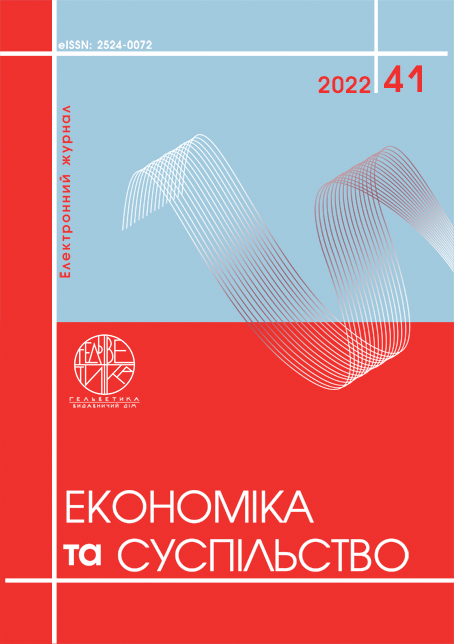ПРОВЕДЕННЯ НЕЙРОМАРКЕТИНГОВИХ ДОСЛІДЖЕНЬ ДЛЯ ПІДВИЩЕННЯ ЕФЕКТИВНОСТІ РЕКЛАМНОЇ ДІЯЛЬНОСТІ
Анотація
Все більше відомих світових брендів використовують нейромаркетингові дослідження, до яких належать інструментальні та соціально-психологічні методи. У статті розглянуто нейромаркетингові дослідження як засіб підвищення ефективності рекламної діяльності. Загалом необхідність маркетингових досліджень обумовлена потребою отримання інформації для мінімізації або усунення маркетингових ризиків при прийняття рішень, що забезпечується шляхом наявності достовірних даних. Традиційні маркетингові дослідження попри наявність методів дослідження, які вже давно стали класичними, не завжди дозволяють отримати достовірну інформацію, через похибки, які виникають в процесі роботи з респондентами. Натомість нейромаркетингові дослідження покликані забезпечувати більш глибокий аналіз реакції мозкової активності потенційних чи реальних споживачів. Оскільки з розвитком інформатизації та діджиталізації споживач стає більш вибагливим, виникає необхідність розширення застосування інструментарію маркетингових та нейромаркетингових досліджень.
Посилання
Вудвуд В.В., Білоус А.Я. Нейромаркетинг – новітній інструмент впливу на поведінку споживачів у недосконалих умовах ринкової економіки України. URL: http://innoveconom.in.ua/archive/InnEco_7-45/50.pdf
Жмай О.В. Становлення та розвиток концепції нейромаркетингу в сучасних умовах. Ринкова економіка: сучасна теорія і практика управління. 2018. Т. 17. Вип. 1(38). С. 157–170. DOI: https://doi.org/10.18524/2413-9998.2018.1(38).135569
Belasku A. (2020). Neuromarketing ethics: how far is too far? URL: https://cxl.com/blog/neuromarketing-ethics
Dengfeng Yan, Jaideep Sengupta (2021). The Effects of Numerical Divisibility on Loneliness Perceptions and Consumer Preferences. Journal of Consumer Research. Vol. 47. Issue 5. February. P. 755–771. DOI: https://doi.org/10.1093/jcr/ucaa026
Hayes S.C., Law S., Malady M., Zhu Z. & Bai X. (2019). The centrality of sense of self in psychological flexibility processes: What the neurobiological and psychological correlates of psychedelics suggest. Journal of Contextual Behavioral Science. DOI: https://doi.org/10.1016/j.jcbs.2019.11.005
Jerath Kinshuk and Ren Qitian. (2020). Consumer Attention to Favorable and Unfavorable Product Information, and Firm Information Design (January 7, 2020). DOI: http://doi.org/10.2139/ssrn.3515285
Krajnovic A., Sikiric D., Jasic D. (2012). Neuromarketing and customers free will. Proceedings of the 13th Management International Conference. P. 1143–1163.
Lindstrom M. (2010). Buyology: Truth and Lies About Why We Buy. Currency. 272 p.
Murphy E.R., Illes J., Reiner P.B. (2008). Neuroethics of neuromarketing. Journal of Consumer Behaviour: An International Research Review, Vol. 7, issue 4‐5, pp. 293–302. DOI: https://doi.org/10.1002/cb.252
Meyer J.H., De Ruyter K., Grewal D. et al. (2020). Categorical versus dimensional thinking: improving anti-stigma campaigns by matching health message frames and implicit worldviews. J. of the Acad. Mark. Sci. 48, 222–245. DOI: https://doi.org/10.1007/s11747-019-00673-7
Woodwood V., Bilous A. (2018) Neuromarketing is the newest tool for influencing consumer behavior in imperfect conditions of the market economy of Ukraine. Available at: http://innoveconom.in.ua/archive/InnEco_7-45/50.pdf
Zhmay O. (2018) Formation and development of the concept of neuromarketing in modern conditions. Market economy: modern theory and practice of management. Vol. 17. Issue. 1(38). P. 157–170. DOI: https://doi.org/10.18524/2413-9998.2018.1(38).135569
Belasku A. (2020) Neuromarketing ethics: how far is too far? Available at: https://cxl.com/blog/neuromarketing-ethics
Dengfeng Yan, Jaideep Sengupta (2021) The Effects of Numerical Divisibility on Loneliness Perceptions and Consumer Preferences. Journal of Consumer Research. Vol. 47. Issue 5. February. P. 755–771. DOI: https://doi.org/10.1093/jcr/ucaa026
Hayes S., Law S., Malady M., Zhu Z. & Bai X. (2019) The centrality of sense of self in psychological flexibility processes: What the neurobiological and psychological correlates of psychedelics suggest. Journal of Contextual Behavioral Science. DOI: https://doi.org/10.1016/j.jcbs.2019.11.005
Jerath Kinshuk and Ren Qitian. (2020). Consumer Attention to Favorable and Unfavorable Product Information, and Firm Information Design (January 7). DOI: http://doi.org/10.2139/ssrn.3515285
Krajnovic A., Sikiric D., Jasic D. (2012) Neuromarketing and customers free will. Proceedings of the 13th Management International Conference. P. 1143–1163.
Lindstrom M. (2010) Buyology: Truth and Lies About Why We Buy. Currency. 272 p.
Murphy E., Illes J., Reiner P. (2008) Neuroethics of neuromarketing. Journal of Consumer Behaviour: An International Research Review, Vol. 7, issue 4–5, pp. 293–302. DOI: https://doi.org/10.1002/cb.252
Meyer J., De Ruyter K., Grewal D. et al. (2020) Categorical versus dimensional thinking: improving anti-stigma campaigns by matching health message frames and implicit worldviews. J. of the Acad. Mark. Sci. 48, 222–245. DOI: https://doi.org/10.1007/s11747-019-00673-7


